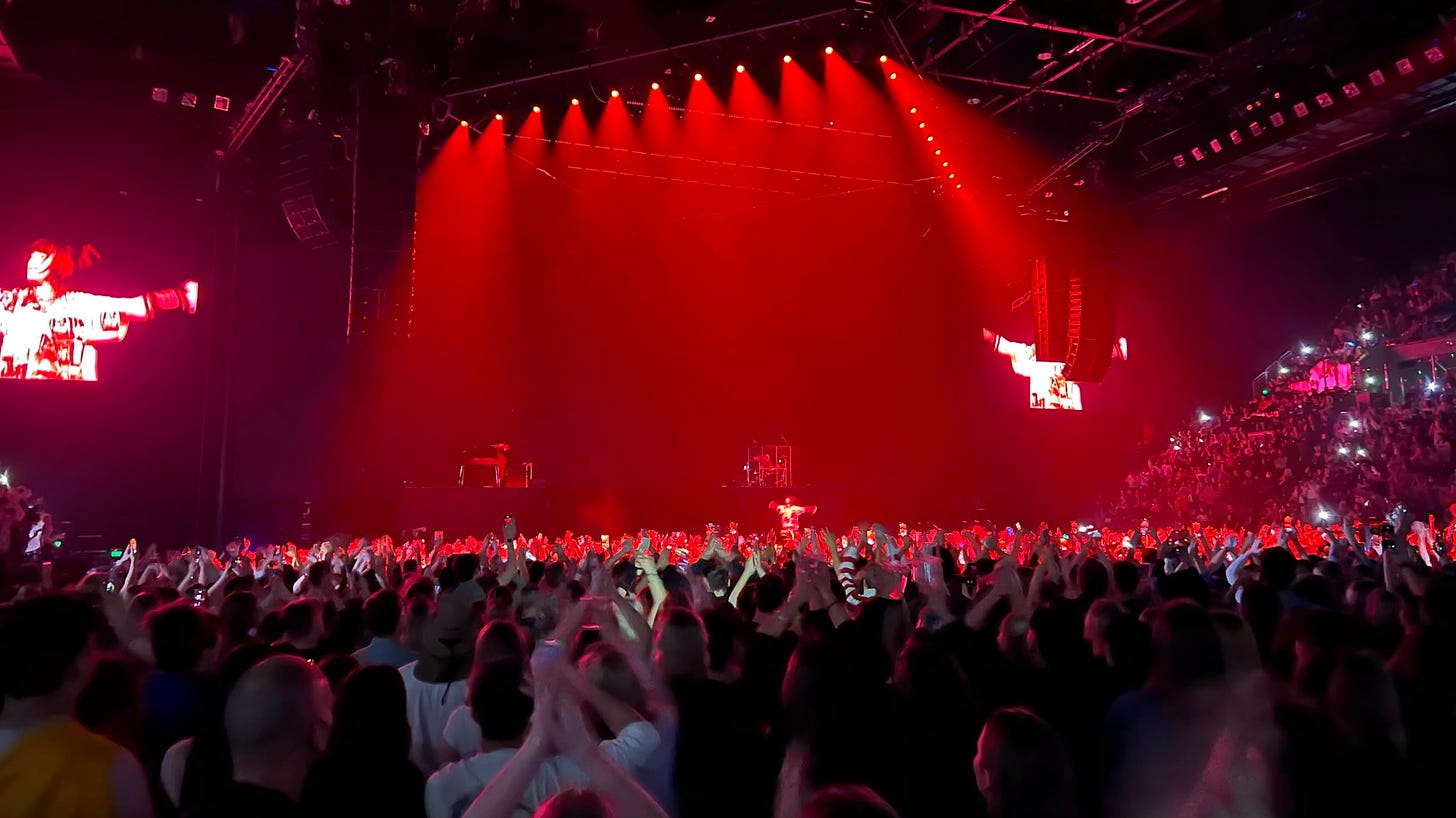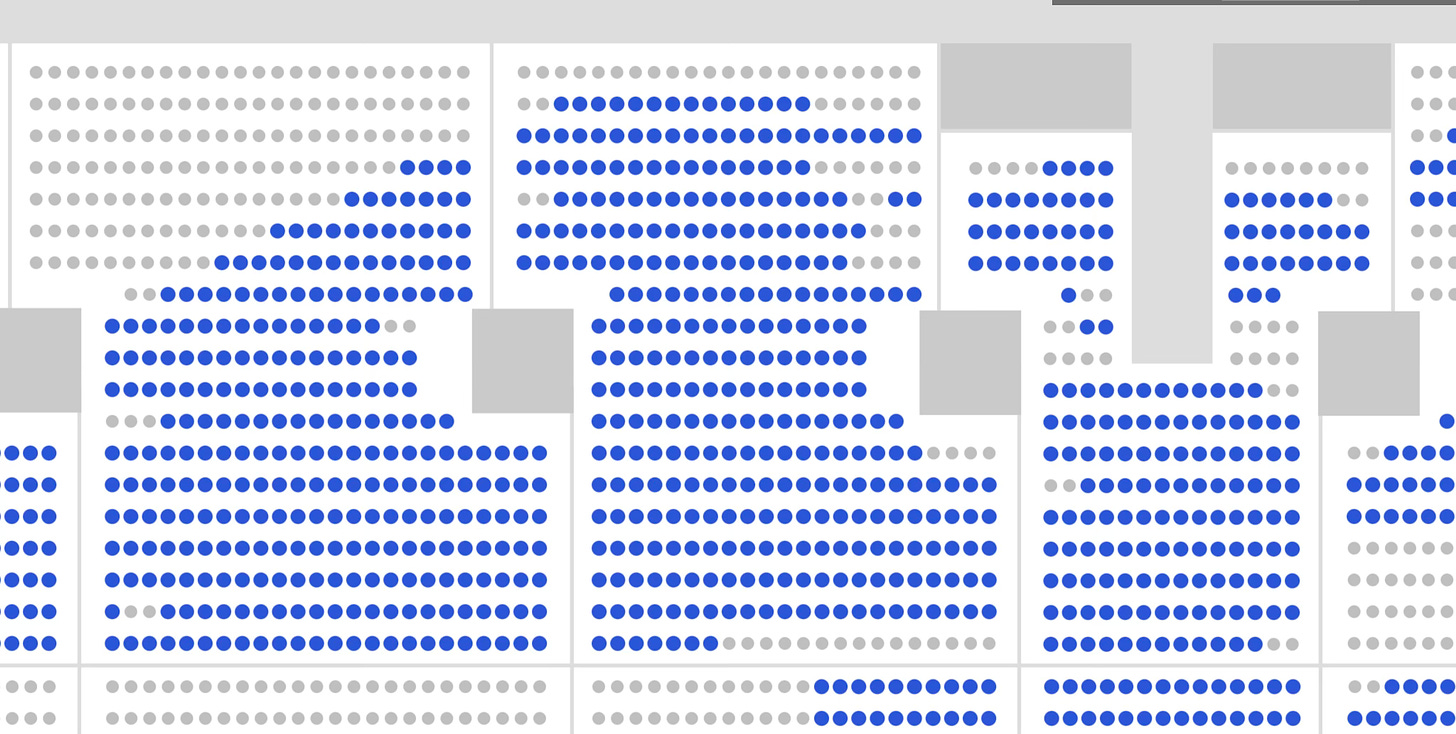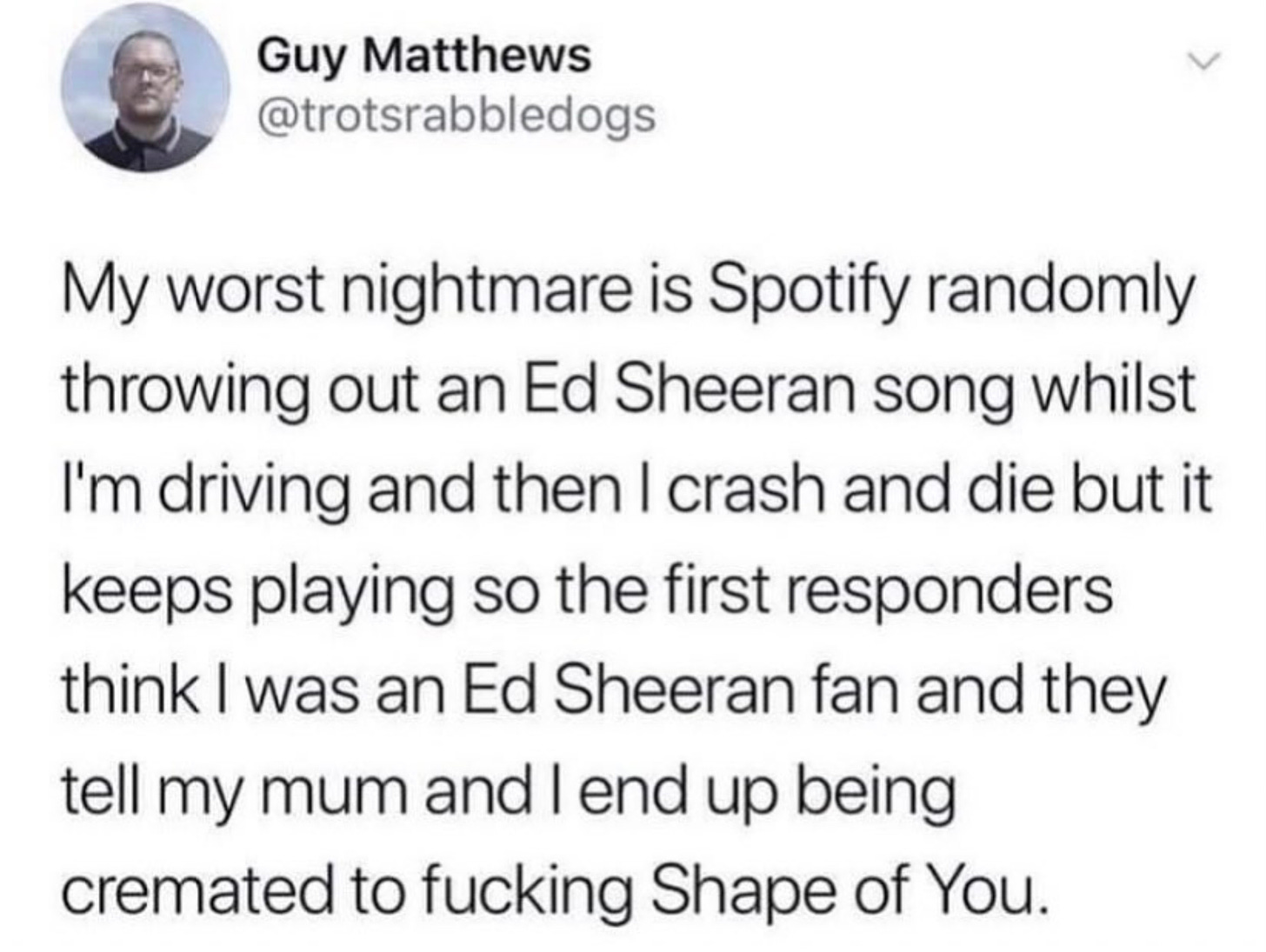Big shows by major artists are only for the rich now.
Want to see your favourite acts play live? You're going to need flights, accommodation – and some pretty expensive tickets too.
Three school friends and I had concocted a plan. For our first concert, we wanted to drive from Whanganui to Auckland in a mate’s beaten up blue Toyota to see Pearl Jam perform at Mt Smart Supertop. We were 15 years old. It was 1995. None of us had been to a show before. We’d barely been away from home for more than a night. So, to force our parent’s hand, we pre-purchased four tickets. They cost us $49.95 each – about $100 in today’s money, according to the Reserve Bank’s inflation calculator.
Our parents took one look at the rusty Toyota and balked. They decided we could go if we took the train instead. So, after a sleepless overnight trip, we left our stuff with a distant relative then headed to South Auckland, where I saw more people than I had ever seen in my life. With 10,000 in attendance, Pearl Jam’s first of two Auckland shows was about as big as it could get in the mid-1990s. Aside from a rare visit from Michael Jackson or ZZ Top, artists didn’t really perform in stadiums. It wasn’t a thing.
So, we had the Supertop, a sweaty circus tent, that was attracting major talent. Everyone from 50 Cent to the Foo Fighters, Missy Elliott to KoRn, Snoop Dogg to Metallica, and Prodigy to Garbage, came to play there. Every January, at the Big Day Out, that tent was turned into the Boiler Room, where Fatboy Slim, the Chemical Brothers, Dizzee Rascal and M.I.A all closed out the festival in the sweatiest possible way. Over time, it became my happy place. (Yes, this newsletter is named after that venue.)
By 2013, the circus tent was gone, but a flash new venue was attracting a new wave of international talent. Spark Arena, a purpose-built arena capable of holding more than 12,000 people, had stepped up to replace the Supertop. It was thriving. That year alone, Taylor Swift, Rihanna, Ed Sheeran, Paul Simon, Linkin Park, One Direction, Leonard Cohen, Justin Bieber, Tool, Beyoncé and the Red Hot Chilli Peppers all came to visit, to play in that venue. Many of those acts played multiple nights. I saw and reviewed most of them. That starry-eyed kid from Whanganui was living his dreams.
Fast forward to 2022. At the first of three sold out Spark Arena shows, I was in the crowd chaperoning my daughter to her first show, to see the goth-pop star Billie Eilish. Tickets were well over $200 each and I’d sat through some incredibly stressful Ticketmaster queues trying to get my hands on them. It was her fourth tour here after shows at The Tuning Fork in 2017, Laneway in 2018, and Spark Arena in 2019, a fast but typical run for a rising star hitting the global touring circuit.
There, Billie Eilish made specific mention of how much she loved coming to Aotearoa. “When people ask about my favourite place in the world, I tell them New Zealand,” Eilish told the crowd. Aotearoa was one of the first places Eilish ever toured. Her 2019 show was her first performance in an arena, after which she said she “went backstage and bawled”. We are, according to this interview, her favourite country to visit. “If somebody asked me, ‘What’s your favourite place to play? What’s your favourite place to go?’, I’m like, ‘New Zealand,’” she said.
Together, Eilish and Aotearoa have history. And yet, when Eilish next visits our part of the world in February and March for her Hit Me Hard and Soft world tour, it means nothing. She isn’t coming here. Instead, she’s performing four nights each in Brisbane, Sydney and Melbourne. At the time the shows were announced, it caused an outcry. “She saw New Zealand swarm to Australia for Taylor [Swift] and is expecting us to do the same,” one complained, presciently.
This is a very troubling trend. From now until the middle of next year, a tidal wave of some of the world’s biggest international acts will tour Australia, from Olivia Rodrigo to The Weeknd, Kylie Minogue to Katy Perry, and The Killers to Green Day. Those are the kinds of shows we used to get all of the time, yet, at the time of writing, none have announced New Zealand shows. “There was just no time,” Frontier Touring told me about The Killers; “We tried but it wasn’t meant to be,” Live Nation said about Green Day. The days of stars coming to us seem to be over.
I have told these two stories for a reason. Back in the 1990s, a broke Whanganui teenager could, if they wanted to, scrape together enough money from a part-time job as a supermarket butchery assistant to buy a Pearl Jam ticket and a dicey train trip to get to their very first concert, to see the world’s biggest band, in one of the biggest arenas we had. It was possible. You could do it, if you wanted to. I know that because I did it.
Right now, I don’t see that same possibility. For starters, concert tickets are far higher than they used to be. Next month, Pearl Jam return to Go Media Stadium, a short walk from the concrete car park where the Supertop used to sit. It will be nearly 30 years since their first show here. Tickets cost $209.10 for general admission, $272.65 for a Golden Circle moshpit ticket, or $399.90 for a Pearl Jam Premium pass – far more than the $49.95 I paid in 1995, even when adjusted for inflation.
But that’s an act doing that rare thing: bothering to come here at all. As Billie Eilish, Olivia Rodrigo and all those other acts we’re missing out on prove, many are not. Instead, they’re following Swift’s lead and setting up shop for multiple nights in larger Australian venues, then expecting us to make the trip. That means fans here face a much bigger expense than just concert tickets: paying thousands of dollars in flights and accommodation, and taking time off work, to see their favourite acts play live. That is an expense far beyond me, and far beyond many – unless, I guess, you’ve just sold your Onehunga investment property, one of seven, for a tidy profit.
Who do we blame for this? Maybe Swift, who set the precedent, who proved you don’t need to tour as many countries as possible and can instead make fans come to you. Or, perhaps, our lack of infrastructure is to blame, the fact that Eden Park’s limit of six shows is a severe restriction on the amount of talent that can come here. Or, possibly, it’s our idiot government’s fault for fuelling a cost of living crisis with their constant negativity and cuts. Or, maybe, it is the result of promoters getting the yips after lacklustre sales for Travis Scott’s Eden Park show and a second Pearl Jam show.
Clearly, many things have changed. A memo has gone around, a Slack message has been sent, a group chat has begun, a reply all email has been delivered: Aotearoa is not a place you want to be touring right now. Many in the industry, it seems, are listening. The next act planning to do this exact thing? You may have heard of them. They’ve been in the news a bit lately. Yes, a reunited Britpop band will, according to reports, do exactly the same thing as everyone else and bypass Aotearoa to play shows in Australia next year.
If you’re a broke kid living in Whanganui, I’m really sorry, but you’re shit out of luck.
Thanks for being here. Boiler Room is a reader-supported newsletter. If you can afford to make a small monthly donation it really would help keep this thing going…
Everything you need to know.
Speaking of Oasis, they’re dumping dynamic pricing for international ticket sales, ending the scandal that caused an outcry in the UK. “It is widely accepted that dynamic pricing remains a useful tool to combat ticket touting and keep prices for a significant portion of fans lower than the market rate and thus more affordable,” the band posted on social media. “But when unprecedented ticket demand ... is combined with technology that cannot cope with that demand, it becomes less effective and can lead to an unacceptable experience for fans.” Hmm.
As for ticket prices, Rolling Stone magazine ($$) has a deep dive on why the ticket-buying process has become such an extreme experience that the Department of Justice has taken out a lawsuit against Live Nation. “People love music, and a monopolist is getting in the way of their ability to access it and making their lives more expensive,” says Jonathan Kanter, the assistant attorney general heading up the antitrust division and helming the lawsuit. He tells the publication he’s never worked on a case that makes people so emotional. (Live Nation rejects the claims.)
Imagine arriving at a show, being pulled aside and asked why you were there, and how much you knew about the act. That’s exactly what happened to The Last Dinner Party fans when they arrived for a gig in Lincolnshire last week. “I got asked how long I had liked them for, and to name my favourite song,” one fan said. “[I] got whisked away, searched, asked condescending questions.” said another. Meanwhile, for The Guardian, Laura Snapes says this is an entirely normal experience for woman and minorities who go to shows alone.
For The Spinoff, Lyric Waiwiri-Smith dives into the demise of the Grey Lynn Library Hall and finds it’s yet another blow to the all ages music scene. One promoter says there’s a cycle every all ages venue goes through. “Kids come, they find out it’s a place you can just go drink outside in the car park, and gradually [the owners] have to get stricter and stricter because they’re getting in trouble,” he says. “I really think this is symptomatic of people in Auckland who think that anything happening in their backyard is negative, and are resentful of the sound of people. ‘I pay rates, therefore I get to call noise control.’”
Chappell Roan is cancelling live shows, saying she needs to prioritise her mental health as her career continues to explode. “Things have gotten overwhelming over the past few weeks and I am really feeling it,” she said after pulling out of her All Things Go festival appearance. “I feel pressures to prioritize a lot of things right now and I need a few days to prioritize my health. I want to be present when I perform and give the best shows possible.” That New Zealand show she promised us is looking less and less likely by the day.
Sometimes you find a song so deliciously calming you wouldn’t mind if it ran for half an hour. That’s how I feel about ‘Feed My Release,’ the new single from folksy UK singer-songwriter Naima Bock. So, good news! It’s taken from her new album, Below a Massive Dark Land, that’s full of songs just like it, and it’s out now.









Seems I'm way too easy to please - musically speaking. Some might even say, a cheap date - for the month of October at least....
Saturday 5th Louis Baker, San Fran, Te Whanganui a Tara Wellington $53.53
Friday 11th Tami Neilson [Sings Nelson 🥹] Opera House Te Whanganui a Tara Wellington $112.33
Thursday 28th Delaney Davidson and Barry Saunders, Suites Gallery, Cuba Street,Te Whanganui a Tara Wellington $58.50
Too lazy to leave home? Definitely. Lucky in live? That too!
Don't judge me for my home advantage, Chris 😌.
I'm a happy customer. I can have my home comforts, and live concerts too.
Of course, I will need earplugs for San Fran and the Opera House - I'm sensitive to a loud sound.
Lastly, in memory of Kristoffer [Kris] Kristofferson.
https://youtube.com/shorts/vfPoUZQQY8M?feature=shared
When I was a young kid I walked to our local village shops and bought myself a secondhand album - A Star is Born.
I got lucky - the album was newly released.
And so began a nearly 50 year love affair with Barbra Streisand and Kris Kristofferson.
My older sisters mocked me as I lay on the floor in our lounge, my head pressed to the large speaker - sound down as low as I could get it - in an attempt to avoid being mocked for listening to my beloved album on repeat 😅
I still own the album, it was the first in my collection. It still has the $3 price inked on the jacket.
I love that it turned out my childhood musical idols are also people who spend / spent their lives advocating for a better world.
Thanks for your writing, Chris. I really enjoy reading you.
Concert tickets are yet another item that has gone up in price out of step with inflation.
Honestly, I get suspicious of big concerts with high price tags, and I assume the high pricing is some form of greed somewhere along the line - venue costs or equipment costs or whatever. Someone is overcharging someone.